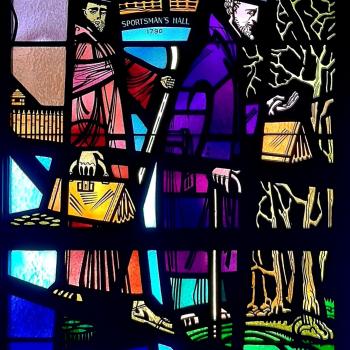It might well be that Jesus is the only one who would place an order. American Evangelicalism has longed harbored a strain of teetotalism while the Qur’an strictly forbids Muslims from drinking alcohol. Jesus, of course, turned water into wine, according to the Gospel of John.
Relations between Christians and Muslims have been on my mind lately not only because of the daily deluge of anguish coming from many Muslim-majority nations (most recently Pakistan), but also because the honors program that I direct at Gordon College recently hosted a local imam, Dr. Imam Talal Eid, on the topic of “How Muslims Read the Qur’an.” It was an instructive experience for my students and for me.
Any Christian reading the Qur’an will be struck by the significance that it accords to Jesus even if he not treated as the deity incarnate. What does the Qur’an say about Jesus? It might surprise you. Here are a few facts:
-Muslims believe in the Virgin Birth of Jesus by Mary, announced to her by the angel Gabriel, who says: “‘I am only a messenger from your Lord, [to announce] to you the gift of a righteous son.’ She said: ‘How can I have a son, when no man hath touched me, nor am I unchaste?’ He said: ‘So your Lord said That is easy for Me [God]: And [We wish] to appoint him as a sign to mankind and a mercy from Us), and it is a matter decreed [by God]’” (Qur’an 19:16-21).
-Muslims believe that Jesus performed miracles, including raising people from the dead (Qur’an 5).
-Muslims believe in a version of the “resurrection,” but in their interpretation Jesus did not die; rather he was called up to be with God and he will come again: “God lifted him to His presence” (Qur’an 4).
-Muslims believe in the return of Jesus (as the Messiah) to earth, although the role and reason for his return differ from what Christians believe. In fact, for Muslims Jesus will return to earth to prove his mortality and to refute false beliefs held about him. He will live a normal life, marry, and then die as any other human.
-Muslims believe that before Jesus’ death he will vanquish the Antichrist, and all people will recognize and accept the true religion, Islam.
-Finally, many Muslims believe the Jesus himself foretold of another prophet, Mohammed, who would be sent. This is a common Muslim interpretation of John 14:16: “And I will give you another Counselor (i.e. Mohammed) to be with you forever, even the spirit of truth.”
To be sure, the huge difference remains that while Christians equate Jesus with the incarnate God and include Him as an aspect of God’s triune nature, Muslims believe that Jesus was a prophet, albeit a very important one, sent by God to preach the essential oneness of God. In this view, deifying Jesus, making him a “partner” or an “associate” of God, constitutes a grave blasphemy against the oneness of God. For this reason, both the outer and inner Qur’anic inscriptions on the Dome of the Rock mosque in Jerusalem begin with a pointed rebuke to Christians: “In the name of God, the Merciful the Compassionate. There is no god but God. He is One. He has no associate” (emphasis added).
These are some of the facts, essential for Christian-Muslim dialogue—a task today as difficult as it is important. I am grateful for Imam Talal Eid for his instruction.
(Incidentally, Dr. Eid is the founding director of the Boston Islamic Institute. He is an outspoken critic of violence done in the name of Islam (or of any religion). In May of 2007, he became the first Muslim cleric appointed to the US Commission on International Religious Freedom . . . Finally, permit me to indulge in a brief advertisement: On September 21, 2015, the Center for Faith and Inquiry at Gordon College will host a conference, “Islam in the Classroom: The Challenges and Opportunities of Teaching about Islam in a Post 9/11 Age.” For further information, one could contact [email protected].)
















